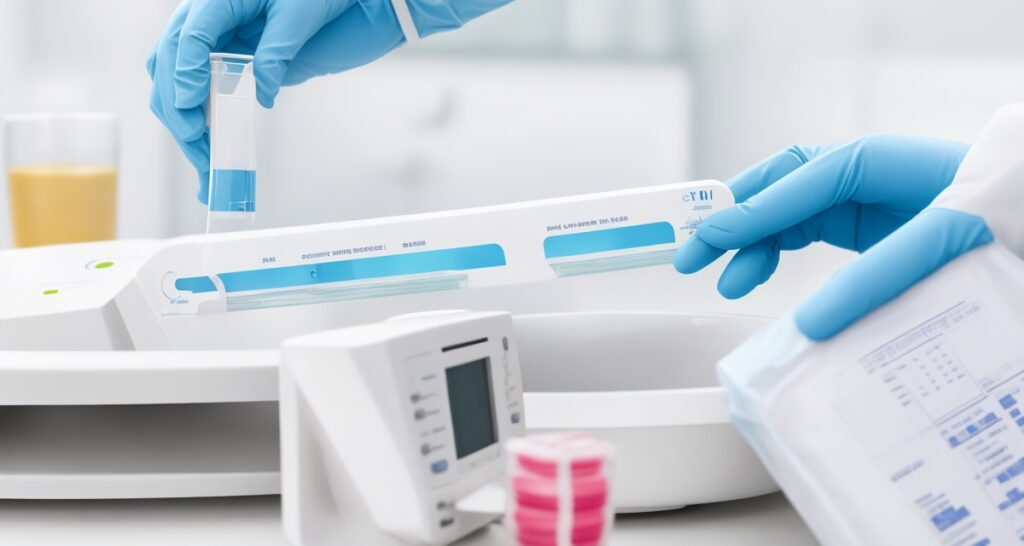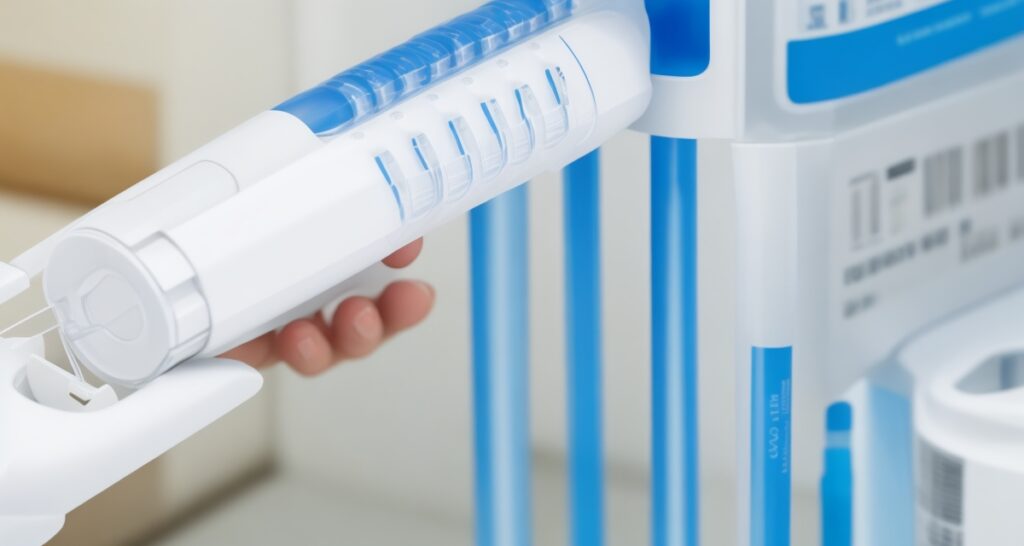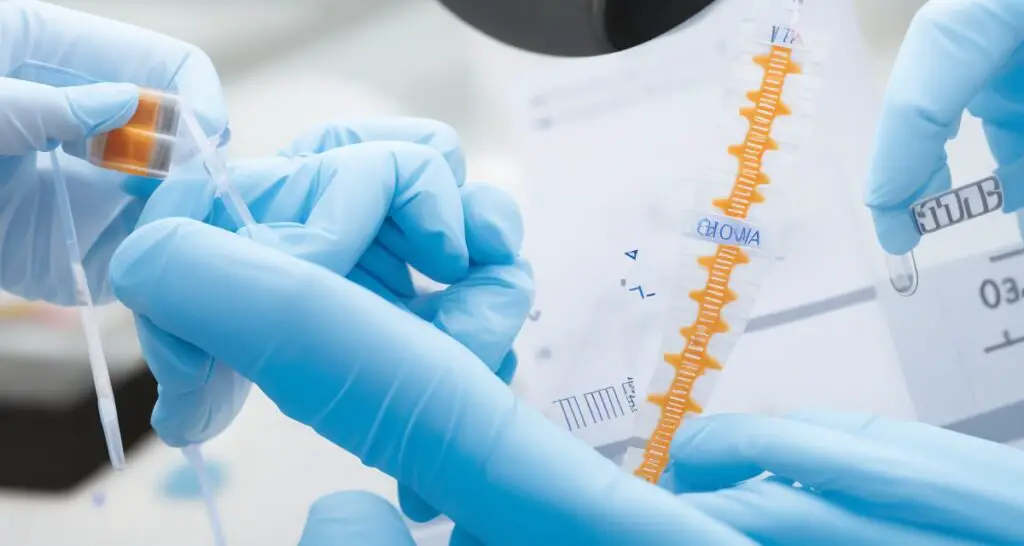The question of “How much does it cost to do a DNA test?” can vary significantly depending on several factors, making it essential to understand the nuances of pricing when considering this valuable genetic analysis. Whether you’re interested in ancestry testing, paternity testing, or health-related genetic testing, a multitude of factors can influence the overall expense.
These factors include the type of test you require, the provider you choose, and the complexity of the analysis. In this brief overview, we’ll delve into these factors and provide insights into the various pricing structures and options available for DNA testing, helping you navigate the cost considerations associated with this increasingly popular field of genetic exploration.
Different Kinds of DNA Testing:

1. Ancestry Exploration:
Ancestry DNA tests are designed to uncover the story of your genetic lineage, unveiling insights into your cultural background and family connections. Prices typically fall within the range of $79 to $199, though they may fluctuate based on the extent of analysis and the testing company you select. For more comprehensive assessments, like those provided by AncestryDNA and 23andMe, you can expect costs to be positioned at the upper end of this price spectrum.
2. Health Insights:
DNA tests related to health provide valuable insights into your genetic predisposition for certain health conditions, your status as a carrier of inherited diseases, and personalized recommendations for well-being. Health DNA testing costs typically range from $99 to $299 or even higher, especially for specialized assessments like whole-genome sequencing.
3. Paternity Determination:
Paternity tests serve the purpose of confirming biological relationships, primarily between potential fathers and children. The cost of such tests can vary, depending on whether they are conducted at a professional laboratory or via a home testing kit. Lab-based tests usually range between $300 and $500, whereas home testing kits offer a more affordable option, with prices starting at approximately $30 to $100.
4. Genetic Analysis for Specific Traits:
Some genetic tests are tailored to specific traits or conditions, such as assessing hereditary cancer risk or determining responses to certain drugs. Costs for these tests vary widely, with basic single-gene tests typically priced around $100, while more extensive multi-gene panels can range from $500 to several thousand dollars.
5. Complete Genome Sequencing:
Whole genome sequencing represents the most comprehensive form of genetic analysis, thoroughly examining your entire genetic code. This thorough exploration tends to be more expensive, with costs ranging from $1,000 to $2,000 or more.
6. Self-Guided Genealogy and Research Kits:
Apart from DNA testing for health and ancestry, there are self-guided genealogy and research kits available. These kits empower you to conduct your own genetic research and analysis. Prices for these kits vary depending on the included services and tools.
When considering a DNA test, conducting thorough research and comparing different testing providers is advisable. Keep in mind that prices may vary due to promotions, package options, and the depth of insights offered. Additionally, factor in any extra fees, such as those related to data storage, ongoing updates, or access to a broader database of genetic information, which may impact the total cost of your DNA test.
Exploring Factors That Influence DNA Testing Costs:

When it comes to the expenses related to DNA testing, it’s about more than just numbers. In this section, we’ll take a closer look at the key aspects that shape the pricing of DNA testing, shedding light on why costs can vary significantly.
Nature of the Test:
The kind of DNA test you choose plays a crucial role in determining the cost. Whether it’s for ancestry, health, paternity, or specialized genetic insights, each has its unique complexity and pricing structure based on the depth of information it provides.
Choice of Service Provider:
Your decision regarding the company or laboratory you select for your DNA test can notably impact the price. Established and renowned providers often charge higher fees, while newer or less well-known entities may offer more cost-effective options.
Depth of Genetic Analysis:
The thoroughness of the genetic analysis required influences the cost. Tests that involve more in-depth examination, such as whole genome sequencing, naturally come with a higher price tag than less comprehensive tests.
Testing Method:
The manner in which the DNA test is administered, whether in a professional laboratory or through a home testing kit, can affect the cost. Lab-based tests typically carry a higher price, while home kits tend to be more budget-friendly.
Additional Features:
Extra services and features like data storage, ongoing updates, and access to extensive genetic databases may come with added fees. These supplementary services can contribute to the overall cost of your DNA test.
Special Offers and Packages:
Many DNA testing providers frequently provide promotions, discounts, and package deals, especially during special occasions or holidays. These promotions can result in substantial savings.
Geographic Location:
The location of the testing provider can impact pricing, as the cost of living, labor, and overhead expenses can vary by region.
Quality and Certification:
Laboratories and providers with recognized accreditation and a reputation for precision and reliability may charge higher fees due to the quality assurance and compliance standards they uphold.
Privacy and Data Handling:
Some individuals are willing to pay extra for enhanced privacy and secure handling of their genetic data. Providers that prioritize these aspects may charge slightly higher fees.
Complexity of Genetic Analysis:
If the genetic analysis necessitates a more intricate examination of multiple genes or genetic markers, the costs are typically slightly higher.
Understanding these factors will guide you in making well-informed decisions when considering a DNA test, ensuring that you select the test that aligns with your needs and budget.
Analyzing Costs: At-Home vs. Clinical DNA Testing

In the realm of DNA testing, two primary options merit consideration: at-home testing and clinical testing performed within certified laboratories or healthcare facilities. Each of these choices presents a unique set of advantages and limitations that can significantly influence your financial considerations and the testing experience.
At-Home DNA Testing:
Advantages:
- Cost-Effective: At-home DNA testing kits often provide a more budget-friendly solution than clinical testing. Prices for ancestry, health, or paternity tests typically range from approximately $30 to $199, depending on the complexity and the specific provider.
- Convenience: At-home tests offer simplicity and convenience. You can collect your DNA sample at your own pace and within the comfort of your own home, making it particularly appealing to those who value a private and less intrusive testing process.
- Accessibility: These testing kits are readily accessible online and do not necessitate a visit to a healthcare provider, ensuring accessibility for a broad spectrum of individuals.
- Privacy: At-home tests often afford you greater control over your genetic data and who has access to it. You can opt to share your data selectively.
Considerations:
- Accuracy Considerations: Certain at-home tests may be limited in accuracy, especially when compared with clinical testing performed under controlled conditions with stringent quality standards.
- Limited Support: While at-home kits typically include customer support, you may not have access to professional genetic counselors or medical guidance if you encounter questions or concerns about your results.
- Challenges in Sample Collection: Some individuals may find it challenging to collect a DNA sample accurately, potentially affecting the precision of the results.
Clinical DNA Testing:
Advantages:
- Heightened Accuracy: Clinical DNA testing within certified laboratories is renowned for its elevated accuracy, rendering it a fitting choice for medical, diagnostic, and legal applications.
- Expert Guidance: You benefit from access to genetic counselors and healthcare professionals who can interpret your results and furnish guidance based on your genetic information.
- Comprehensive Testing: Clinical testing facilities offer a wide array of genetic tests, spanning from diagnostic assessments to carrier testing and even encompassing advanced options such as whole genome sequencing.
Considerations:
- Greater Costs: Clinical DNA testing typically has a higher price tag than at-home kits. Prices can fluctuate substantially, depending on the type and complexity of the test and whether it’s covered by insurance.
- In-Person Appointments: Clinical testing commonly requires a visit to a healthcare facility, which may be less convenient in contrast to the self-collection process of at-home kits.
- Privacy Considerations: Clinical testing may entail sharing your genetic data with healthcare providers, which could raise privacy concerns for specific individuals.
The decision between at-home and clinical DNA testing should be made with careful regard to your financial considerations, the intended purpose of the test, the requisite level of accuracy, and your preferences concerning privacy and convenience. For genealogical pursuits and basic health insights, at-home testing may be suitable. In cases involving medical or legal significance, clinical testing is often the favored choice due to its precision and access to professional support.
Unexpected Costs and Additional Charges

As you embark on your journey into the world of DNA testing, it’s crucial to be well-informed about the potential surprise expenses and extra fees that may arise. These unanticipated costs can have a notable impact on your overall budget for testing. Let’s take a closer look at some of the concealed expenses that you should keep in mind:
Shipping and Handling Fees:
When you choose to utilize at-home DNA testing kits, you may come across charges related to shipping and handling. These fees account for the cost of sending the kit to your location and receiving your sample at the testing company’s facilities. While some providers offer complimentary shipping, others may pay a separate fee.
Data Storage Costs:
A number of DNA testing companies extend the option to store your genetic data for future access and updates. However, this service often involves an additional charge, typically on a monthly or yearly basis. It’s essential to comprehend these costs and determine whether you have the choice to opt out of this service.
Interpretation and Consultation Fees:
Although many at-home DNA tests provide basic result interpretation, some individuals may opt for more comprehensive analysis and consultation with genetic counselors or healthcare professionals. These supplementary services may come with extra charges, particularly in clinical testing settings.
Upgrades and Advanced Reports:
Certain DNA testing providers offer advanced reports or enhanced insights for an additional fee. Suppose you’re interested in gaining a deeper understanding of your genetic information. In that case, it’s crucial to be aware that opting for these added features can raise the total cost of your test.
Expedited Processing Fees:
For those who are eager to receive their results promptly, some companies provide expedited processing for an additional cost. This service can be convenient but may involve a premium charge.
Access to Expanded Databases:
Access to a more extensive database of genetic information can enhance the comprehensiveness of your ancestry or health insights. However, certain providers may impose an additional fee to grant you access to these expanded databases.
Follow-Up Tests:
In some scenarios, your initial DNA test results may suggest the need for follow-up or confirmation testing. These additional tests can incur additional expenses in addition to the initial cost of the test.
Return Shipping Costs:
When sending your DNA sample back to the testing company, you might be responsible for the costs associated with return shipping. It’s prudent to clarify these expenses in advance.
Insurance and Coverage:
Depending on the type of DNA test and its intended purpose, your health insurance may or may not cover the associated costs. It’s important to communicate with your insurance provider to determine the extent of potential coverage and reimbursement.
By staying informed about these potential hidden costs and considering them in your testing plans, you can ensure that your budget aligns with your expectations. Prior to proceeding with your DNA testing, it’s advisable to thoroughly review the terms and conditions of your chosen testing provider, and don’t hesitate to ask questions if any elements related to costs remain unclear.
Navigating Health Insurance and DNA Testing
When it comes to DNA testing and health insurance, it’s important to clearly understand how your coverage may help alleviate the associated expenses. To provide you with a more detailed perspective, here are the specific aspects to consider when it comes to insurance coverage for DNA testing:
1. Purpose of the Test:
The extent of your insurance coverage often hinges on the purpose of your DNA test. Some insurance providers may cover tests with medical or diagnostic objectives, particularly if the test is prescribed by a healthcare provider. These medical reasons may include identifying genetic predispositions to diseases or confirming a genetic condition.
2. Pre-Authorization:
In specific situations, obtaining pre-authorization from your insurer may be necessary before undergoing DNA testing. Pre-authorization involves seeking approval from your insurance provider to confirm that the test is deemed medically necessary. It’s advisable to contact your insurance company to determine whether pre-authorization is a requirement.
3. In-Network Providers:
Health insurance plans typically establish a network of preferred healthcare providers. If you opt for clinical DNA testing, choosing an in-network laboratory or facility can impact the extent of your coverage. Choosing a healthcare provider who is not in your network could lead to increased expenses from your own pocket.
4. Coverage Limitations:
Many insurance plans impose restrictions on the types of DNA tests they cover and the frequency of coverage. For example, you may be permitted one genetic test for a specific medical condition per year.
5. Genetic Counseling:
Certain insurance plans cover genetic counseling before and after DNA testing. This can involve sessions with a genetic counselor to help you comprehend the implications of your test results.
6. Reimbursement Process:
If you decide to pay for an out-of-pocket DNA test, you may be eligible for reimbursement from your insurance company. Initiating this process typically entails submitting a claim with all pertinent documentation, including a copy of the healthcare provider’s prescription, receipts, and test result reports.
7. Prior Authorization and Medical Necessity:
Some insurance providers may mandate evidence of medical necessity and prior authorization for DNA tests. Your healthcare provider may need to provide comprehensive information on why the test is medically necessary for your situation.
8. Non-Covered Tests:
It’s essential to be aware that certain DNA tests, particularly those related to ancestry or non-medical purposes, are generally not covered by health insurance. If your test falls into this category, the likelihood of receiving reimbursement is low.
9. Effective Communication:
Keeping communication lines open with your healthcare provider and insurance company is pivotal. They can provide valuable guidance on navigating the coverage process and assist with any requisite paperwork.
10. Appeal Process:
If your insurance provider denies coverage for a medically necessary DNA test, you retain the right to initiate an appeal. This process involves presenting supplementary information and documentation to support your case.
While health insurance can be a valuable tool for mitigating DNA testing expenses, it’s important to acknowledge that coverage specifics can significantly vary from one insurance plan to another. To ensure that you maximize the benefits available to you, it’s advisable to consult with your insurance provider, collaborate with your healthcare professional, or seek the guidance of a genetic counselor. This tailored approach can help you navigate the process with confidence.
Seizing Cost-Saving Opportunities: Discounts and Promotions for DNA Testing
When it comes to DNA testing, it’s worthwhile to be informed about ways to make it more budget-friendly. Discounts, promotions, and special offers are avenues to consider. Let’s take a closer look at these opportunities:
1. Seasonal and Holiday Sales:
Many DNA testing companies offer special promotions on occasions like Black Friday, Cyber Monday, and annual holidays. These sales often feature substantial discounts, making it a great time to consider purchasing a test.
2. Bundle Packages:
Some DNA testing providers offer bundle packages combining different tests or services at a reduced cost. This can be a cost-effective way to access a variety of testing options.
3. Referral Programs:
Numerous companies have referral programs that enable you to refer friends and family. In return, you may receive discounts, complimentary tests, or other rewards when someone you’ve referred makes a purchase.
4. Group Discounts:
If you’re planning to have multiple family members or friends undergo testing, check if the company offers group discounts. Some providers offer reduced rates when multiple tests are purchased together.
5. Email Subscriptions:
Subscribing to a DNA testing company’s email newsletter can grant you access to exclusive discounts and promotions. These deals are often made available to subscribers before the general public.
6. Special Events and Anniversaries:
DNA testing companies occasionally celebrate anniversaries or special events with discounts. Keep an eye on their websites and social media channels for announcements.
7. Loyalty Programs:
Some companies have loyalty or rewards programs where you accumulate points with each purchase. Over time, these points can be redeemed for discounts or even free tests.
8. Educational Discounts:
Students, educators, and healthcare professionals may be eligible for special discounts from certain DNA testing providers. Check to see if your profession or educational status qualifies you for reduced pricing.
9. Online Coupons and Promo Codes:
Prior to making a purchase, consider conducting an online search for coupons or promo codes related to your chosen DNA testing company. These codes can provide substantial savings during the checkout process.
10. Membership Discounts:
Some organizations or memberships, such as AARP or certain health and wellness programs, may offer discounted DNA testing services as a member benefit.
11. Social Media Contests:
Keep an eye on the social media pages of DNA testing companies. Some run contests and giveaways where you can win free tests or enjoy discounts.
12. Flash Sales and Limited-Time Offers:
DNA testing companies occasionally offer flash sales or limited-time offers. These time-sensitive deals can result in significant savings, so it’s advisable to act promptly when you see them.
You can make DNA testing more affordable by staying informed and exploring these diverse avenues for discounts and promotions. Before making a purchase, reach out to your chosen DNA testing provider to inquire about the availability of these opportunities.
Unveiling the World of DIY DNA Testing: An Affordable Alternative
If you’re seeking a budget-friendly path for DNA testing, you might want to explore the world of do-it-yourself (DIY) DNA testing kits. These kits offer a cost-effective means of delving into your genetic heritage and gaining valuable insights. Let’s explore this topic further to gain a better understanding.
1. Cost-Effective Nature:
- DIY DNA testing kits tend to be gentler on the wallet in comparison to clinical testing. Depending on the complexity and the provider, prices for ancestry, health, or paternity tests typically fall within the range of $30 to $199. This budget-friendly aspect makes them an appealing choice for individuals mindful of their financial constraints.
2. User-Friendly Convenience:
- DIY tests are thoughtfully designed to be user-friendly. They allow you to collect your DNA sample at your own pace and within the comforts of your home. This is particularly advantageous for those who prioritize a discreet and non-invasive testing experience. The convenience of avoiding in-person appointments can also translate to cost savings.
3. Easy Accessibility:
- These kits are readily accessible online and do not necessitate visits to healthcare providers. You can conveniently order a kit from the comfort of your home, effectively reducing travel expenses and the time commitment required.
4. Personalized Privacy Control:
- DIY tests typically grant you more control over your genetic data and who can access it. This element of personalization provides a level of privacy that many individuals find valuable. You can selectively choose with whom you share your data.
5. Consideration of Additional Costs:
- While DIY kits may initially seem cost-effective, it’s vital to be mindful of potential supplementary expenses. These might encompass fees for shipping and handling when sending your sample to the testing company or charges associated with accessing and storing your data on the provider’s platform. To ensure clarity, it’s wise to thoroughly review the terms and conditions to comprehend the pricing structure.
6. Quality and Precision:
- DIY tests have made significant advancements in terms of accuracy. Clinical testing conducted in a certified laboratory is renowned for its high level of precision. Clinical testing might be the preferred choice despite its higher cost if you require the utmost accuracy, particularly for medical or legal purposes.
By opting for a DIY DNA testing kit, you can harness the advantages of affordability, convenience, accessibility, and privacy. Nevertheless, it’s of utmost importance to thoughtfully contemplate your specific needs and the desired level of precision before making a decision. Ultimately, your budget, preferences, and objectives will guide you in selecting the most cost-efficient path for DNA testing.
Conclusion
The cost of a DNA test can vary widely depending on several factors, including the type of test, the provider, the scope of testing, and any additional services offered. Basic ancestry tests are often more affordable, while medical genetic testing and comprehensive analysis tend to be more expensive. It’s essential to be aware of any potential hidden fees, such as shipping, subscription, or data storage costs, and to compare prices and services from different DNA testing providers carefully.
While some low-cost or free options are available, they may have limitations. Additionally, individuals should look for discounts, promotions, and coupon codes to potentially reduce the overall cost of DNA testing. Ultimately, the cost of a DNA test is a variable that should be considered in the context of one’s specific needs and budget.
FAQs Of How Much Does It Cost To Do A DNA Test?
How much does it cost to do a DNA test?
The cost of a DNA test can vary significantly depending on the type of test and the provider you choose. The price can range from as low as $50 to over $2000. Here are some common factors that influence the cost:
Type of Test: Basic ancestry tests, such as those offered by companies like AncestryDNA or 23andMe, are often on the lower end of the price spectrum. More comprehensive tests, like medical genetic testing or forensic DNA analysis, tend to be more expensive.
Provider: Different DNA testing companies offer various packages at different price points. Prices can vary, so it’s essential to research and compare options.
Scope of Testing: The depth and breadth of the analysis can also affect the cost. Basic ancestry tests may only analyze a limited number of markers, while medical genetic tests may examine a broader range of genes.
Additional Services: Some providers offer extra services, like access to databases, health reports, or consultation with genetic counselors, which can add to the overall cost.
Are there any hidden fees associated with DNA testing?
While many DNA testing companies provide a clear price for their testing kits, it’s crucial to be aware of potential additional fees. These may include:
Shipping and handling fees: The cost to ship the DNA kit to you and back to the testing company may not be included in the initial price.
Subscription fees: Some DNA testing companies offer ongoing access to their databases or updates on your genetic information for a recurring subscription fee.
Data storage fees: Some companies may charge additional fees if you choose to store your DNA data for an extended period.
Before ordering a DNA test, it’s essential to read the terms and conditions carefully and check for any potential hidden fees.
Is there a significant price difference between different DNA testing providers?
There can be a substantial price difference between different DNA testing providers. Some well-known and reputable companies offering DNA testing services may have competitive pricing for basic ancestry tests. In contrast, others may focus on more specialized and comprehensive tests, which can be significantly more expensive.
Comparing prices and services from various providers is a wise approach. Make sure to consider the reputation and the quality of the testing, as well as the specific type of information you are seeking. Price should not be the sole determining factor; the test’s accuracy and comprehensiveness are equally important.
Can I find free or low-cost DNA testing options?
While some free or low-cost DNA testing options are available, they often come with limitations. For example:
Research Studies: Some academic and research institutions conduct DNA testing for research purposes and may offer free or low-cost participation. However, the results may not be as comprehensive as commercial DNA tests.
Non-profit Organizations: Some non-profit organizations provide subsidized DNA testing for specific purposes, such as genetic health screening.
Government Programs: In some countries, government agencies or health departments may offer DNA testing services at reduced costs for certain medical or legal purposes.
It’s essential to research and ensure the credibility and accuracy of any low-cost or free options before proceeding.
Are there discounts or promotions for DNA testing available?
Many DNA testing companies often run promotions, discounts, and sales, especially during holidays or special occasions. Additionally, some companies offer discounts when you purchase multiple DNA kits at once, such as for family members. It’s a good idea to sign up for email newsletters or follow the companies on social media to stay informed about any ongoing discounts or special offers. Additionally, check for coupon codes or promotional codes that can be applied during the checkout process to reduce the overall cost of the DNA test.

